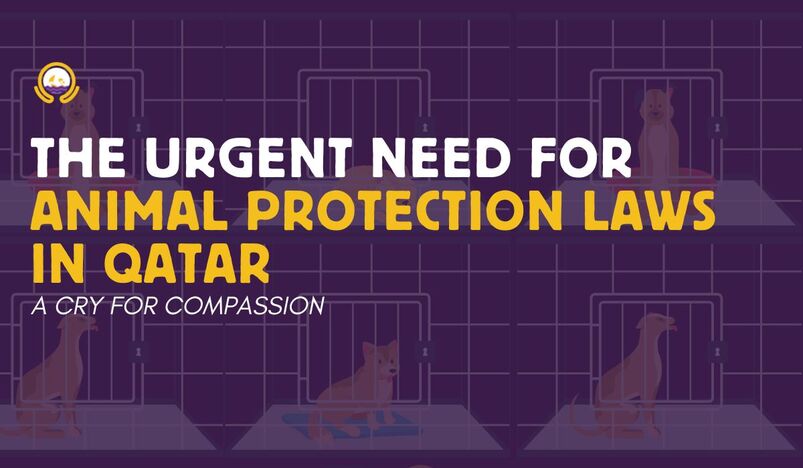
While most parts of the world have established robust laws and policies to protect animals, the Souq Waqif and Souq Wakrah market in Qatar tells a different story.
The lack of stringent laws prohibiting animal abuse and providing comprehensive protection has led to countless heartbreaking stories and the loss of numerous animal lives. Animals, like humans, are living creatures with feelings.
Animals under human care have fundamental rights. To be free from pain, injury, disease, abuse, neglect, and fear should be a given for any living being, and in this case, the animals of Souq Waqif and Souq Wakrah.
The living conditions of the market animals are nothing short of a hellish existence for these innocent creatures. The sight is distressing and brings tears to anyone with a compassion for animals.
It is a scenario that demands immediate attention and action.
A visit to Souq Waqif reveals a grim reality. Animals are kept in cramped, unsanitary conditions with little to no regard for their well-being.
Birds are crowded into small cages, often without enough space to spread their wings. Puppies and kittens are confined to tiny enclosures, with minimal food and water out in the sweltering heat. Many animals exhibit signs of distress and malnutrition.
The lack of veterinary care only exacerbates their suffering.
And let’s not forget about the animals in Al Khor Zoo either. The fact that these animals are all kept in confined, living in singularity
The absence of laws to protect these animals is glaring. In many countries, animal welfare is backed by strict regulations and enforcement mechanisms.
Qatar, despite its inclusive environment, rapid modernization and economic progress, lags behind in this crucial aspect of humane animal treatment.
Implementing animal protection laws should not just be a legal necessity but a moral imperative. These laws should include regular inspections of markets and pet shops, penalties for abuse and neglect, and mandatory veterinary care for all animals sold or kept in public spaces.
Animal welfare organizations in Qatar have a pivotal role to play. These groups must advocate for legal reforms and raise public awareness about the plight of animals in markets like the souqs.
Educational campaigns can help shift public perception, emphasizing that animals are sentient beings deserving of respect and care. Collaborations with international animal rights organizations can also bring in much-needed expertise and support for local efforts.
Relocating animals from the current conditions in Souq Waqif and Souq Wakrah to more humane environments is an urgent step. Animal shelters and sanctuaries can provide the care and rehabilitation these creatures desperately need.
Furthermore, promoting adoption over purchase can reduce the demand for animals in markets, encouraging more humane treatment.
Remaining silent is not an option. We must continue to speak out, whether it's to our friends or within our communities. Every voice counts in the fight for these voiceless creatures. Let's work together to ensure a safer, kinder future for all animals in Qatar.
The situation in Souq Waqif and Souq Wakrah is a poignant reminder of our responsibilities as humans. We must not turn a blind eye to the suffering of these animals.
By advocating for legal reforms, supporting welfare organizations, and promoting humane treatment, we can make a significant difference.
Let us come together to give these animals the voice and protection they deserve.
.jpg)
Qatar Secures Place Among the World's Top 10 Wealthiest Nations
.jpg)
Hamad International Airport Witnesses Record Increase in Passenger Traffic

Saudi Arabia: Any visa holder can now perform Umrah

What are Qatar's Labour Laws on Annual Leave?
Leave a comment